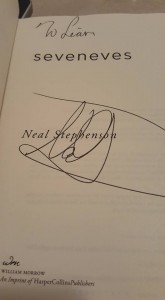(A no-spoilery review.)
 I recently finished Charles Stross’ novel of the posthuman future, Glasshouse. It was closer to his novel Halting State in style, and certainly more readable than its unofficial prequel, Accelerando. While not a perfect novel by any means, and containing a few misses and rough parts, I’m placing it in my top 10 favorite SF novels and top 5 posthumanity-themed works.
I recently finished Charles Stross’ novel of the posthuman future, Glasshouse. It was closer to his novel Halting State in style, and certainly more readable than its unofficial prequel, Accelerando. While not a perfect novel by any means, and containing a few misses and rough parts, I’m placing it in my top 10 favorite SF novels and top 5 posthumanity-themed works.
I stopped reading Accelerando, but not permanently. (Not like Dies the Fire, the probable inspiration for the upcoming TV show, “Revolution.” That book is the only one that I’ve put down mid-way and said, “Nope! I’m done, thank you. No more.”) It really is a fascinating book that depicts the coming singularity, the advent of the posthuman age, in a believable and detailed manner. Unfortunately, I’m finding it a bit too dense, too inscrutable when it comes to the detailed, and far too often, explanations of intellectual property rights and venture investing and whatnot.
In contrast, Glasshouse, like Halting State, is more action and adventure. Where Accelerando explains the posthuman rise, Glasshouse exists in it. We don’t need to be told what’s happening, it just happens. In the opening pages, the first scene, the reader is thrust right in the middle of a strange, new existence where bodies are interchangeable and minds can be backed up and restored. At first, you have no idea if the characters are players in an advanced online RPG, a virtual reality, or what. But soon we come to accept that this setting is post-Earth, post-human, post-normal expectations of what it means to have a body or even an identity. The protagonist, Robin, goes through a crisis of identity involving his past life (lives — in the metaphorical sense, not any metaphysical “reincarnation” sense), while at the same time dealing with his current situation as a test subject in a closed environment meant to simulate late 20th, early 21st century Earth.
One of the most clever conceits of this novel is making most of it take place in a setting that’s vaguely familiar to the reader, if a bit askew (like a collision between the village from “The Prisoner” and the town from “Leave it to Beaver,” with Shirley Jackson’s “The Lottery” and an Ikea display showroom), and allowing that to counterpoint the characters and their floundering in this environment. We can understand the posthuman world better because of the way the characters who live in that foreign world react to the things and ways of our world–and at the same time provides the cognitive estrangement needed to examine our own ways and mores with their arbitrary restrictions and customs.
Meanwhile, Robin must solve a couple of mysteries, one involving who these people are running the experiment, and the other involving his missing memories.
Glasshouse is well-written and moves reasonably quick, but there are annoying moments where characters occasionally do or say something odd that pulled me out of the book. Whether it was something that was unmotivated, or awkwardly phrased, I found moments that my reading ground to a halt, I would have to go back and re-read the passage to see if I missed something, and just ended up shrugging and moving on. Fortunately, that was a rare occurrence. The only other complaint, is that some of Robin’s background and history would be presented in flashback with teasingly little in the way of context and explanation. This is fine, when explanation does eventually come and the tangles and loose ends get wrapped up; however, too much of his flashback went unexplained for too long, making it difficult to understand how it motivated some of his fears and goals. By the end, when the whole story starts to come together, I felt it was too late to make me really grasp who he was and what was going on in the past.
Indeed, difficult not just in understanding Robin, but the history of the book as well. The greater wars and conflicts that happened before the novel begins, which helped shape the condition of transhumanity in this story. Some of it in intentional, as, and this is difficult to explain without spoilers, much of history is actually lost to the characters and must, therefore, be lost to us readers. But I feel as though there are too many holes that Stross let go in the backstory that I really needed to have filled before the climax.
Stross and his works appeal to me because of my own keen interest in the topic of post- and transhumanity. It’s been a focus on my own graduate work (and, hopefully, will be the focus of my doctorate work when I finally get to attend Trent University. Oh, yes–one day I shall!), my writing, and my hobbies. I’ve written recently on my love for the pencil-and-dice RPG, Eclipse Phase. The creators of that game, set in a quasi-posthuman universe, have listed Charles Stross as a “writer to watch,” and it’s no wonder why: I don’t think it’s unfair to say that Eclipse Phase was heavily influenced by Glasshouse (and Accelerando), as much as it was inspired by Richard Morgan’s Altered Carbon, and maybe a bit by Cory Doctorow’s Down and Out in the Magic Kingdom. (I really want to see reputation (i.e. Doctorow’s “wuffie”) used more as currency and capital n the game!)
Related Posts:






 I recently finished Charles Stross’ novel of the posthuman future,
I recently finished Charles Stross’ novel of the posthuman future, 
 Once again I’ll be participating in the
Once again I’ll be participating in the